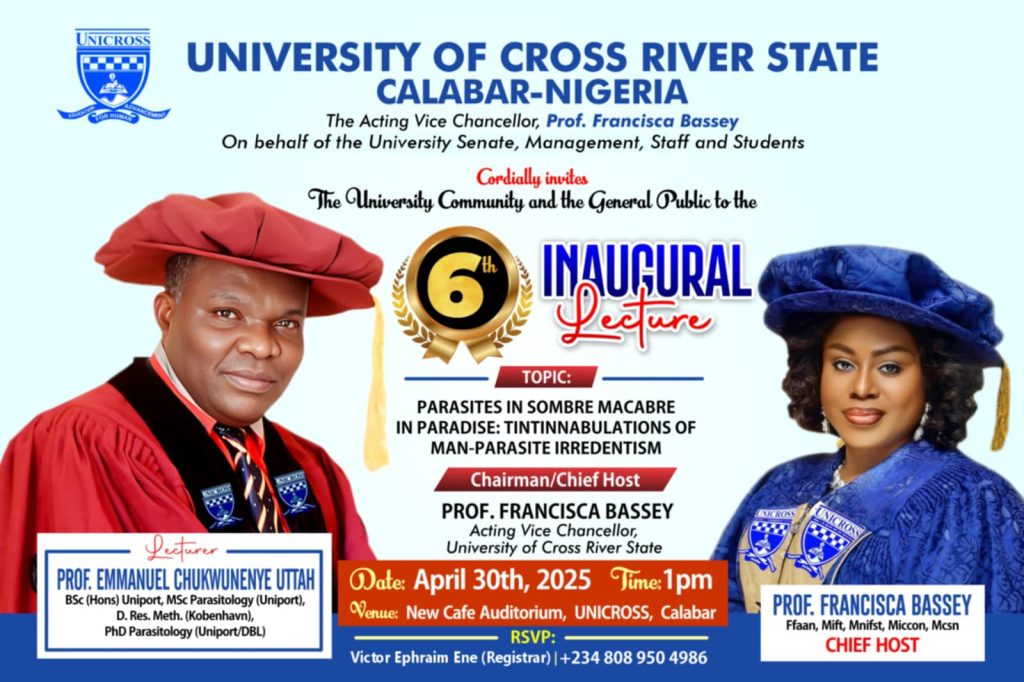Prof. Uttah advocates stronger parasitic disease control at UNICROSS’ inaugural lecture – Converseer
CALABAR – A clarion call for urgent and sustained action against parasitic diseases across Africa echoed through the University of Cross River State (UNICROSS) as Professor Emmanuel Chukwunenye Uttah delivered the institution’s 6th inaugural lecture on Wednesday (April 30, 2025).
Titled “Parasites in Sombre Macabre in Paradise: Tintinnabulations of Man-Parasite Irredentism”, the lecture, which took place at the university’s Calabar Campus new cafeteria, marked the first inaugural address in the field of Parasitology and Public Health.
Prof. Uttah, a distinguished scholar in parasitology and geospatiology, spoke to a full audience of academics, policymakers, and community leaders.
Opening his address with a biblical reference to Exodus 15:25, the professor emphasised the need for African countries to shift from reactive to proactive strategies in the fight against parasitic diseases.
READ ALSO: Olumba lights up Cross River communities with solar energy
“Sustained prevention and treatment must become top priorities not just to save lives, but to enhance cognitive development, school performance, and economic productivity,” Prof. Uttah said.
He recalled the historic Abuja Declaration of April 25, 2000, where 44 African leaders committed to combating malaria, and called for a similar level of political will and action to be extended to other parasitic diseases.
The professor advocated integrating parasite control into primary health care and aligning these efforts with poverty alleviation programmes. He warned that poorly targeted health strategies were undermining progress across the continent.
Emphasising the importance of health education and environmental sanitation, particularly in rural communities, he stated, “The government must prioritise accessible and functional faecal disposal facilities. Public health is not just a medical issue it is a developmental one.”
Prof. Uttah also called for the inclusion of toxoplasmosis screening in prenatal care across Nigeria. “Early diagnosis can prevent fetal infections and reduce the risk of long-term damage,” he said, urging the adoption of a national health policy on the matter.
Raising alarm over environmental health concerns, he warned of increasing levels of heavy metals in food consumed in Calabar and other parts of Nigeria. According to him, these contaminants are nearing the World Health Organisation’s danger threshold. He stressed the need for public awareness and stronger regulatory oversight.
In a thought-provoking segment of the lecture, Prof. Uttah discussed a newly reported parasitic condition in East Africa known as the “Dinga Dinga” disease, which causes victims—particularly women and girls to shake uncontrollably in a dance-like motion.
“This shows that the man-parasite relationship is not just biological, but symbolic and ever-evolving,” he remarked.

The professor also highlighted the role of human behaviour in the spread of parasitic infections. Citing studies that link social interaction with increased susceptibility, he said, “Humans must reconsider their social habits and cultural practices if we are to win the war against parasites.”
He concluded by stressing the importance of community advocacy and leadership involvement. “Community leaders must be engaged. They are pivotal in mobilising people and ensuring compliance with control measures,” he said.
Speaking on behalf of the Acting Vice Chancellor Prof. Fransica Bassey, Prof. Thomas Ojikpong commended Prof. Uttah for his extensive research and commitment to public health. He described the lecture as both enlightening and timely.
He said, “This lecture challenges us as a university community to do more in applying knowledge for the benefit of society; Professor Uttah’s work exemplifies the type of scholarship we seek to nurture—research that is grounded in the realities of our people and aimed at solving practical problems.”
The event was attended by the university’s Bursar, Librarian, Registrar, deans of faculties, heads of departments, members of the university council, and other senior government officials.
Crédito: Link de origem

